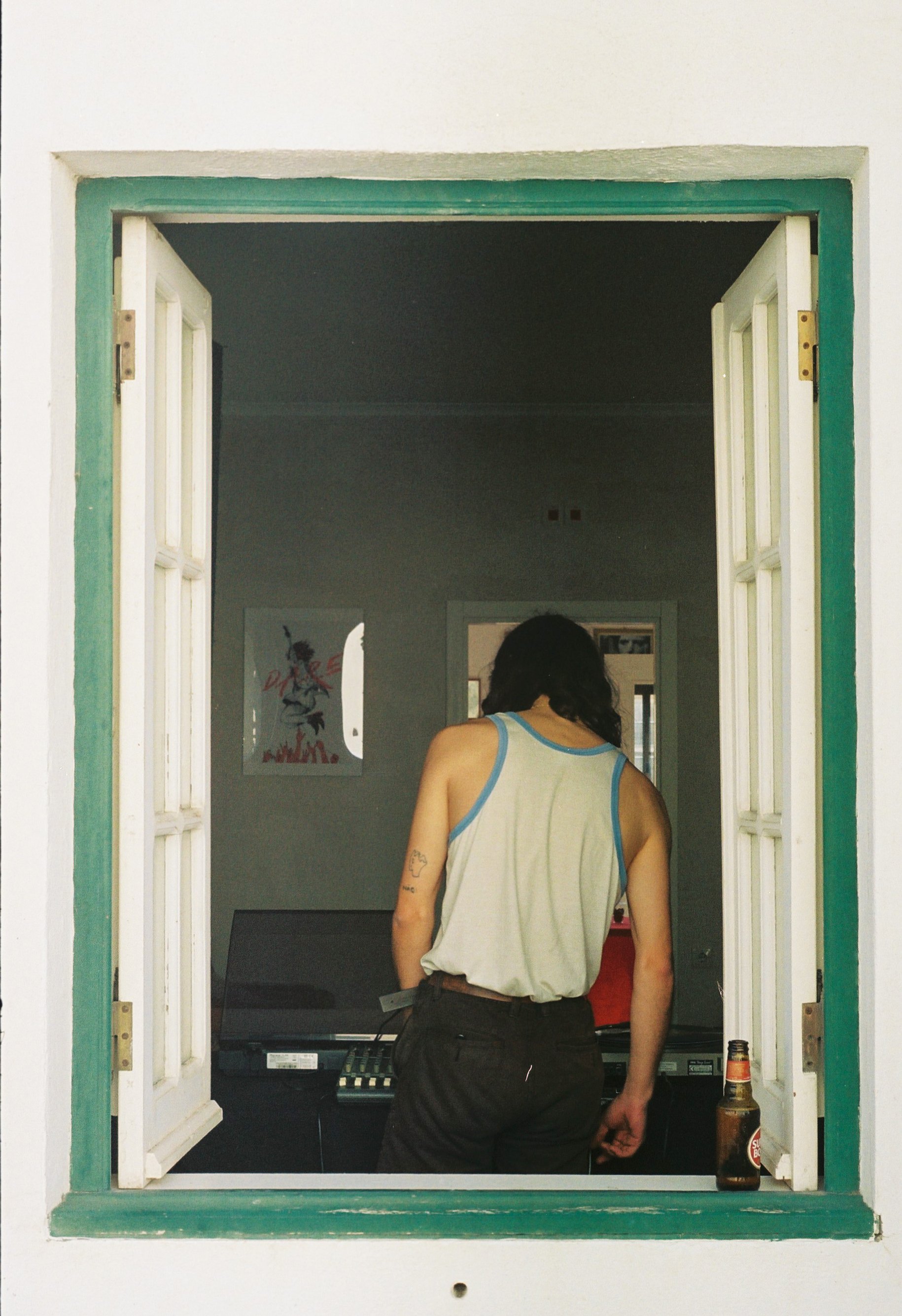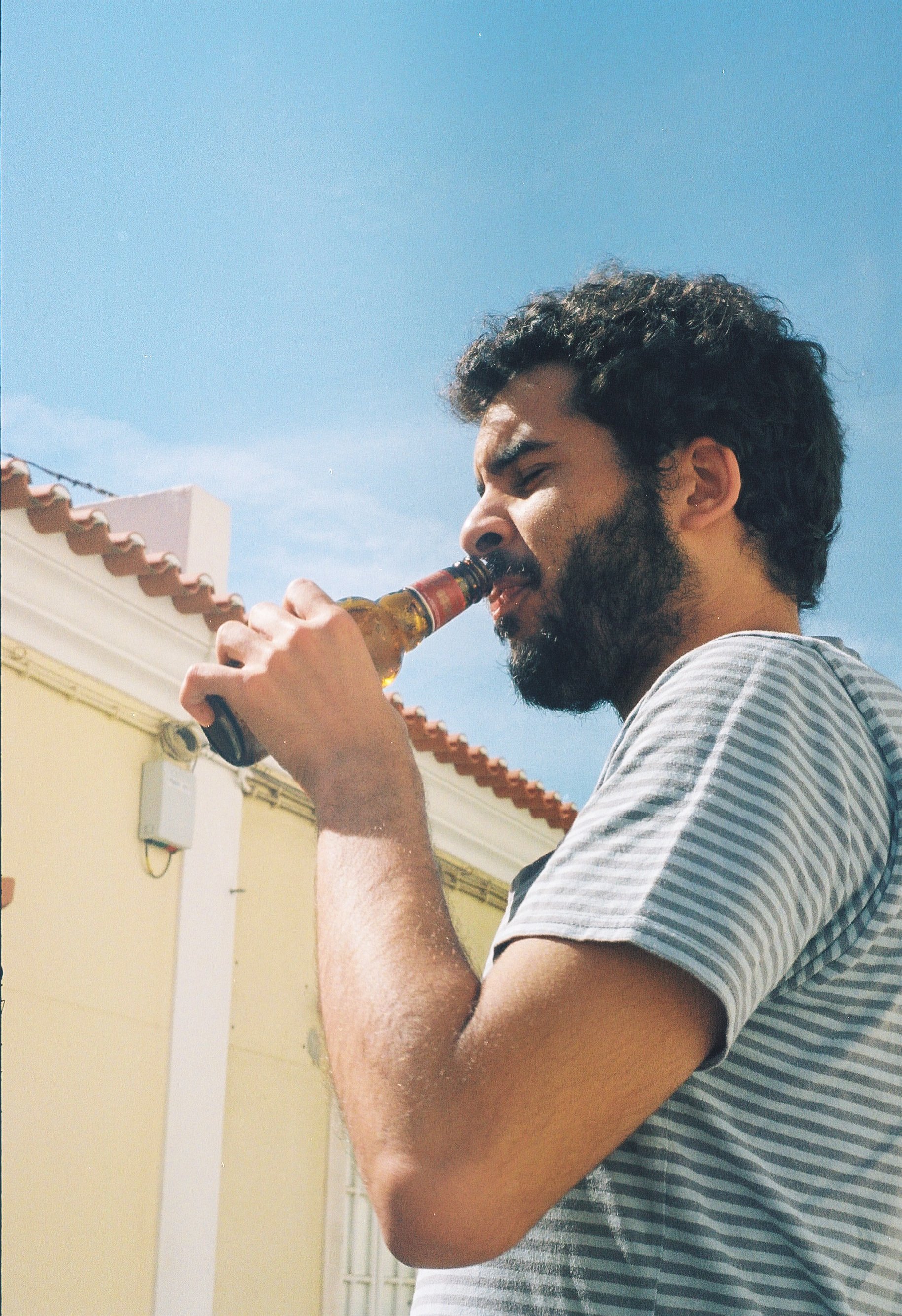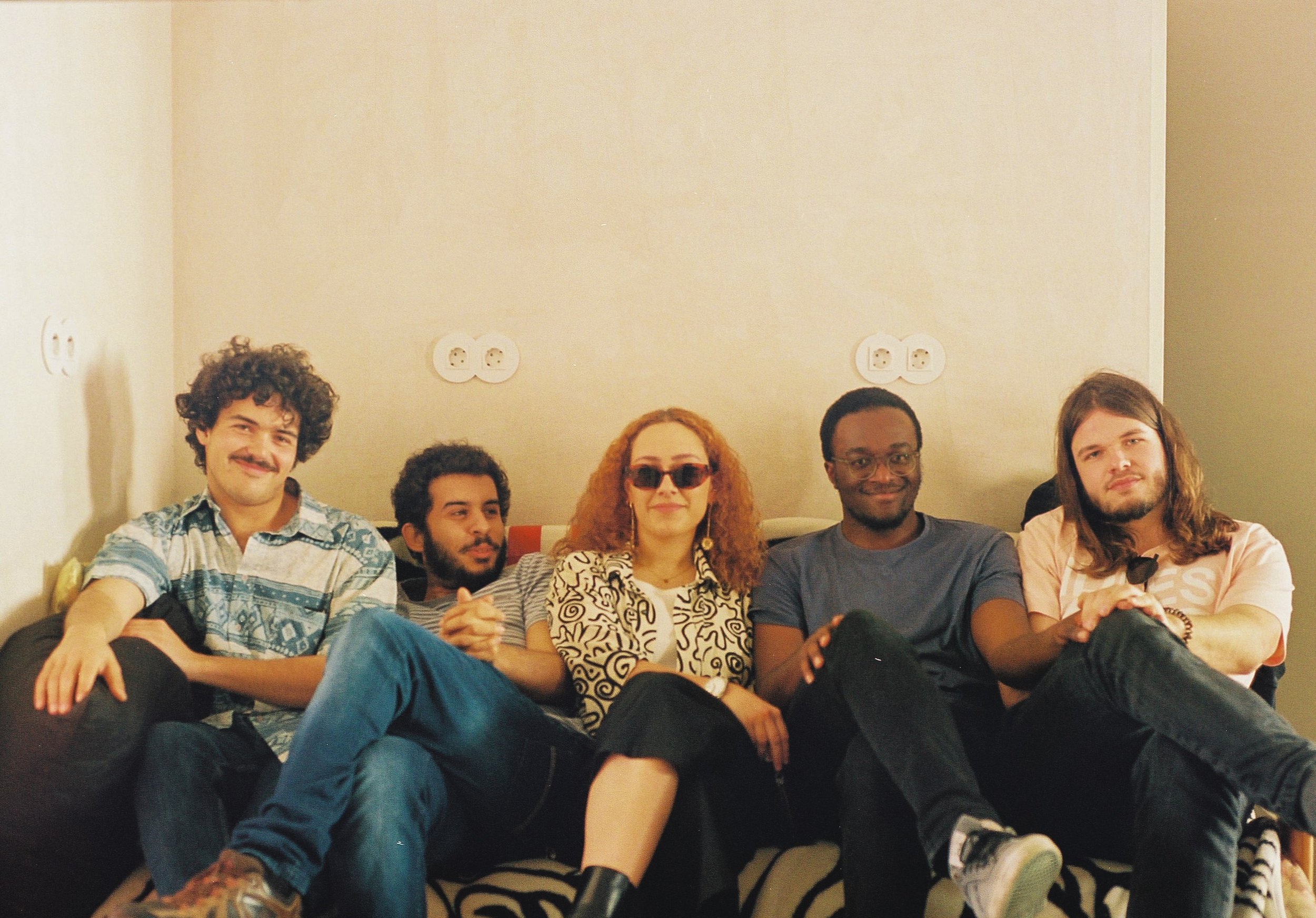
BARREIRO, PORTUGAL
It takes no more than a 30-minute boat ride from affluent Lisbon to Barreiro, a city known for its former heavy industrial activity whose vestiges can still be seen in abandoned factories.
T
The tranquil river piques the curiosity of the few tourists who venture there – most passengers during rush hour are heading home after work, eager to eat and rest.
In the collective imagination of those familiar with it, Barreiro is associated with ugliness and poverty. Once a bustling city, the remaining worker neighborhoods deteriorated. It was in one of these neighborhoods that I first encountered someone who I later discovered was part of a rejuvenating movement brewing behind shores.
Hey!Pachuco, a local association born from the 90’s garage grunge craze, is being revived by a group of six friends in their early twenties. Doing regular programming, bringing acts to Barreiro that otherwise would not come, and revitalizing the youth cultural scene, they give young musicians the chance to have a space to develop and connect.
Now we meet again for lunch at a local restaurant which for two fifty serves a great Bifana with French fries – something unheard of in pricy Lisbon.
Hey! Pachuco
An Interview by Cristiano Elias
On the undervaluation of local music by the portuguese
Yala: What comes from the outside always has more value.
André: Especially in Portugal.
Yala: You see that here in Barreiro and in festivals, a foreign band always gets a bigger cachet, a lot of publicity, but for small bands...
André: It took a pandemic for Paredes [an alternative music festival] to make a day dedicated only to Portuguese music.
Guilherme: It's really cultural, you notice it here – we've been doing our own stuff and the audience we've been building is not from here, it's people who come from Seixal, Montijo —
Yala: And our musician friends, and friends of those friends.
The audience in Portugal is not open to music?
Guilherme: I think there is a cult of personality: people go to the concert for the person on stage more than for the music. They like the whole concept of what the band is and each personality within it, but this doesn't mean that they like live music.
It becomes an extension of personality, or a search for it perhaps. The audience you have is mostly other musicians, isn't it?
Guilherme: Yes, people within the environment.
Yala: Maybe about five to six people who came just to see. Sometimes more or less people, but musicians are the majority of the audience.
Guilherme: It's normal! I think with music it has always served to bring communities together. (...) Music is that, it’s community.
ON SHIFTING ATTITUDES TOWARDS ART
Guilherme: That is increasingly dying out. For example in the 90’s/00's, with the old Hey!Pachuco, people went out at night and to concerts.
Yala: In the old days you had television and nothing else. Now you have PCs, games, social networks.
Guilherme: As society became more isolated, the arts were affected.
Yala: They [the arts] lost their space, because art was the distraction.
Don't you feel that people get tired of sleeping, of being on their phones, and eventually start doing things, looking for events?
André: We are the example of that.
Guilherme: I don't think the [cultural] scenes will die, I think that... that... there will always be stupid people like us making stuff that eventually attracts other people.
Yala: What's missing in the associations is young people coming up to renew the scene. We were lucky in a way.
Guilherme: There was the Young Musicians Program and that’s how we got in the association.
Yala: The program gave you [access to] a rehearsal room once a week for free.
Guilherme: If it wasn't for this, we wouldn't even be playing today.
Yala: It no longer exists.
Guilherme: One of our goals is to resurrect this program to gather younger folks and bring them into this world. It is very expensive for a guy in the 10th grade to pay for a rehearsal room.
Yala: Since 2016 no bands have emerged. Only three bands, two of which are ours. During COVID we had a program, Eco [echo], that was an attempt to bring people in but no one came.
Guilherme: The goal was to have ten musical projects and it was difficult, we had to invite people.
Why was it so difficult?
Guilherme: I think there is a lack of interest because you have a lot of stuff to do and art takes a back seat, only later on when you deal with other shit in life it starts to gain prominence.
ON LISBON CENTRALIZATION
Lisbon is a vicious circle – it has much more supply and demand, so it attracts more artists as well.
Yala: The hype comes from Lisbon, but people don't know the rest of the country.
Guilherme: In musical or artistic terms, you only exist for the big platforms if you are promoted in Lisbon.
Why? Why doesn't it penetrate the rest of the country?
Guilherme: Because that's where everybody is. Money. It's all about money. (...) A person will not go to a concert in Famalicão if he is from Lisbon. And that's normal, transportation in Portugal is really bad, you want to go to Oporto and everything, it takes three or four hours and it's 300km away – that's one hour more than in the middle of Europe. This all contributes to the art scene (...) being very detached. You have the Lisbon scene, the Algarve scene and the Northern scene. The Northern scene is much more interesting because everything there is less remote – you are always 20 minutes away from anywhere.
Yala: It's a matter of Lisboners having the concern and wanting to know what happens outside that space.
André: We manage to attract some folks, mostly from the music [scene], and when they arrive they are pleasantly surprised, like "Hey, so this is Barreiro? Very cool.” It's like the older guys in the association said, it's more of a mental barrier.
The cost to the individual also weighs – each of us could also get up half an hour earlier to run and be healthy but that represents an individual cost that we don't want to pay; that is, the inconvenience of being "away" from home.
Yala: That half hour of getting up earlier, that's what we've always done to go to Lisbon.
André: We make that sacrifice with much more predisposition than they do, we feel. We have the habit of going to concerts in Lisbon.
Yala: You know what's the funniest thing? We take less time to go to college [in Lisbon] than a lot of people in Lisbon [metropolitan area].
Guilherme lets us in King studio, current headquarters of Hey!Pachuco.
Guilherme: There is an exhibition of some girls that we know from Barreiro, with other invited artists. They are the ones who organized it. We have a studio, a rehearsal room. Everything is well isolated. Here’s a photo of the old guys at Hey!Pachuco Fest, the first one, grunge style, showing the early days of the association. Now I'm working more on organizing Hey!Pachuco. The whole "Chamem os Amigos" thing is what gave me organizational skills, which I had to pick up in the middle of it. Basically we wanted to know how to do a festival so we decided to do one every month of the year.
How did you do that?
Guilherme: We had a PA [Public Address], we had a space that was “Os Franceses" who let us do the festival there, and we had the support of Sala 6, who gave us a draught beer machine, and all three elements came together to do a festival. We called bands, our friends, bands of friends. Then it evolved and we started calling other bands. It was just wanting to do it. There was a lot of fucked up shit. But after you do one festival a month, it's all a lot easier. It was great but my back still hurts from carrying PAs. If I've learned anything from Chamem os Amigos, it's that you can always do it, you can always find ways, you can always find money. You have to know how to move and do it. Picos [founder of Hey!Pachuco] has been at this for a long time and at Barreiro Rock, the festival he organized, he lost money. It was with this lesson that he learned, that we have learned: we only do things if we are sure about them. In Chamem os Amigos we were not depending on anything, only on us. It's very DIY. Barreiro Rock was very cool in the beginning because you received money from the city council. But since that depends on the political power [at the time], there are years when you have it and years when you don’t – it depends on the sensibility/connections of the city hall administration, that may see investment in this kind of culture as weak. It stopped happening because there was no money.
Máquina, the invited band for the day’s event, arrives. “Traz o teu disco”, the most recent event brought about by Hey!Pachuco, invites bands to bring their collection of favourite physical discs and vinyls who inspired them to become musicians. At the end, the band plays their own recently released record.
Disconnect between those who do politics and those who make culture.
Guilherme: When you go to present a cultural program to the city council, they don't know anything. The people in power don't understand the problems we have, don't understand what art is. For them it's just another package to bring people together, to educate people. I can count on my fingers the times I have seen council employees [from the cultural office] at concerts.
Won't they have too much work?
Guilherme: But their work is the Culture – you have to be inside the culture. How can you exist within the culture if you don't participate in it? What puzzles me is that there are people in power and even in other associations who don't participate. I understand that it's older people but… They could pay someone to go to concerts.
That would be good.
Guilherme: They've even tried to blame the private sector by saying that it's a lack of private investment, when the opposite is true. It's strange. Politicians are shit.
André and Marta arrive. We chat a little about King. They’re planning on having two monthly events and jam sessions there. All promotion comes from Instagram and word of mouth.
Chamem os Amigos Fest
André: In the last three editions there was support from the city council. Seven editions without support, and when they saw that it worked, they decided to support it.
Are you planning to make more editions?
Marta: Not for now. Without support, it's no good. It’s not because there is a lack of ideas, it’s the rest that’s lacking.
Guilherme: We have jobs and this is an investment in the future and we do it for love, [but] we don’t see any return.
Marta: If you're not in this stuff for the love of it you're not in it. It's too much work and you earn nothing.
Reflections on market laws
Still, have you noticed an evolution in Hey!Pachuco?
Afonso: I knew Pachuco through Barreiro Rock (a local festival), then [when] it was over, (...) the association died. We took it up and now it lives again, but it is still very far from being profitable.
Without being profitable they are always dependent on support.
Afonso: Yes, and willpower. Now with the RRP the next three years are of guaranteed incomes more or less.
Last year Tony Carreira, one of the most famous singers in Portugal infamously accused of heavy plagiarism and overall tackiness, was invited to play at Barreiro’s festivities.
If funding is cut, the rents won’t. It is a difficult question to find that balance and money management. It's not right that Tony Carreira receives 50 thousand euros and you don't even receive 500, but how do you sustain that choice? Inevitably nobody is obliged to have the same artistic sensibility. In an exercise of utilitarian ethics, Tony Carreira may be much more useful to Barreiro than new and pioneer projects in the present – people may feel much happier watching his show than a noise concert.
Afonso: Yes, if you organize a festival in Barreiro with only alternative music names, people look at that and think "what the fuck, I'm not going to vote for PS [The Socialist Party] anymore". It has everything to do with this, there are many optics.
Matilde: In Lamego when they started ZigurFest it was also like that in the beginning, only later the city council realized that even being a small town in the interior there are a lot of people of our age who want new things. So that's when they started to support it.
They don't listen with words, they listen with actions. Each association functions as an individual organism and is forced by the law of the market to compete with each other.
Afonso: It's not even on purpose, it's just the conditions – a natural economic consequence, we are in a city with X number of people. We could be better organized, but then there are also people who beef with one another... we try to stay away from that, there are people with beef among associations, but not with us...
And why?
Afonso: I don't know... maybe frustrated people who have never been to a psychologist. It's a whole generation. I have a theory that if our parents' and grandparents' generation had all gone to the psychologist, the world would be really cool.
The dreaded nine to five
Do you think a lot about your future and Hey!Pachuco's future?
Afonso: A lot... especially now that I'm graduating.
What are you studying?
Afonso: Mechanical Engineering at FCT – and I'm like... this is cool but this is not cool... I like Engineering, it makes me curious, but... I don't fit in at all in college or with the people... I'm an intern now and earning money is cool, but being everyday from 9-5 doing some uninteresting shit... I don't know... I'd rather live with less luxury and have more free time... I don't want to waste my whole life working.
Finally, everyone’s here
How did you meet?
Yala: At school. Marta and Filipa have known each other since high school.
Filipa: We met at our school's demonstration.
Marta: The roof fell in.
Yala: The roof flew off! And we demonstrated.
Filipa: The roof flew up to Lisbon. (Laughs)
André: Two weeks without classes.
Filipa: There we met Afonso, who knew Gui and who knew David.
How did you discover your artistic side?
Filipa: I liked music and wanted to do something related to it and I knew there was an ensemble in Barreiro so I looked it up. They were rehearsing in the library in Barreiro. I talked to Marta and she liked it too and joined. Then Guilherme called us – we started doing voices and chorus in Humana Taranja.
Did you get together because you had a common taste?
Yala: Yes, Guilherme and I had a band before we joined Hey!Pachuco, we were the Arroz com Feijão [Beans with Rice], the best band name there ever was.
You all joined the association together?
Guilherme: Basically we got in through the Young Musicians Program. I had been in Arroz com Feijão then, and then I started making some songs, Yala started making some songs, and we decided to come back with other stuff. We ended up with my project, Humana Taranja, and then we invited people. André came in later to see concerts and with his band with Yala [Walter Walter] and Afonso. It was basically that, little by little we were joining the association that was just old people. And we had a space to do whatever we wanted.
Afonso: We entered when the association was a bit dead. Picos had his life and work, the rest of the guys were already married with kids, so there wasn't much predisposition.
André: There wasn't a group that was energizing the house. We showed up at the right time and started to energize things.
Was there some other external factor, someone pulling you into it, some support from the school? Did the program involve any kind of training?
Guilherme: Nothing, it was just a rehearsal room.
Afonso: It was even better than training... In my opinion, to give space is better — there are a lot of people who don't create [because they don’t have a space], and creating can be a lot of things, creating music, building furniture, I don't know... to have a space for them to explore, a creative space.
A physical space?
Afonso: Yes, a studio in this case.
Yala: It's different playing at home or being in classes and following certain rules than if you're with four or five people in a studio (...) playing.
Filipa: Without being forced into anything.
André: We had a lot of freedom just to exist and create.
Afonso: And Picos had that thing that was zero judgment, "as long as they don't ruin anything [in the studio] for me."
André: There was no good and bad.
Afonso: The second time we went to the studio he opened the door for us and said "Alright, I'll go home and be right back.”.
The incentive came only from you.
Afonso: Yes and giving you the tools to explore something you didn't even know you'd like.
How do you think Barreiro is seen from the outside?
Yala: Unawareness, especially the guys in Lisbon.
Afonso: I think the river is a huge barrier. “Oh, I'd love to go but it's far away" but the 20-minute boat ride is probably less than the time it takes to go from one end of Lisbon to the other by subway. It is a psychological barrier. Little by little we bring people here and they always say "Ah, it's cool after all". You just have to come once...
André: Exactly, and the preconceptions fall thereafter.
Have you brought many people to Barreiro? Do you feel there is a before and after when you joined Hey!Pachuco?
Yala: We've managed to attract a lot of different kinds of people... Before, Hey!Pachuco was geared towards a more specific style of music, which today is a little outdated. Nowadays we bring all kinds of acts here and younger people get to know Hey!Pachuco's work.
Marta: They realize that there are young people doing things outside of Lisbon.
André: Hey!Pachuco was very much associated with the garage style, and we with our programming have been trying to break out of that box a bit.
Yala: We tried to keep some of what was already there, but bring in new scenes as well.
Do you have programming criteria?
Yala, Marta: Things we like.
Filipa: Emerging things too.
Yala: Yes, to be supportive [to younger acts].
Filipa: Because it is financially easier to bring them in and also because it gives space and a stage for new projects.
Can you guarantee cachet [the band’s fee], has that been a major factor?
Filipa: In Chamem os Amigos there was one edition in which we got some support from the city council, so there was a guaranteed cachet. Other than that it’s at the door. But it's previously agreed.
How does the collaboration between Sala 6 and other spaces come about?
Yala: Getting to know people. The owner already knew Picos and since we are the new face of Hey!Pachuco, there is a certain trust.
Afonso: When you have people who want to do things, and you meet other people who want to do things, things happen. Each person brings something different to the table. When people get along well and are organized you even create friendships.
What do you think is the core of your success?
Afonso: The thing about bringing bands here I think has to do with how we receive people, which isn't even about the money, but finding a place for them to sleep if they need to and dinner, if there's no money we'll cook something... We, as a band, have had the experience of driving I don't know how many kilometers to get somewhere, and there's not the least bit of sensitivity in welcoming people.
Marta: Yea, I think that's the norm.
Afonso: You go to a bar and they don't even offer you a sandwich. These little tiny things are what people keep [with them].
Marta: At Sala 6 it’s the connection with people.
Afonso: Yes, treat people well.
How do you manage to survive?
Guilherme: It's a lot of playing around...the studio serves a little bit to pay the rent...with the recordings and rehearsal rooms. We don't make any money out of this... the goal is to one day make some kind of money out of it, but this is a workroom for Picos and me... Now we are going to have that support from the RRP, we have resumed the Young Musicians Program, which will help pay the rent and fund other projects... We have the goal of renewing the program in three years so that we can fund the projects and pay some help to me and Marta and everyone else, to be able to pay back for the work.
Marta: A “help” because we don't take wages from here.
You haven't received the funds yet, how have you been staying afloat?
André: It's from savings.
Guilherme: We haven’t [received the funds], it's late...The money comes from me, from Picos, from the bands rehearsing and recording. That's what it is... Waiting for money. That's the life of culture workers.
Do you feel that you already have a name here? Are you well received by the locals?
Filipa: Within our little niche, yes.
André: New people are coming in too, it's a gradual process. People get to know us first and then the association. It's not a branding thing, where you get to know the association and then the people, but the other way around.
What is your mission?
André: Drenar [to drain, slang for “vibing while partying/creating/doing things”] (laughs)
Guilherme: I don't know if I speak for everyone but I think there is a clear goal – we feel that we are not represented on a cultural level here (and everywhere else). The main goal is to bring what people like and want to hear. If it wasn't for us Máquina wouldn't come here to play. The second goal is to be able to have our artistic life and a cool lifestyle, to continue all together.
Marta: Yea it's important to continue this for our general well being, it's something we do because we like it, with whom we like [the antipode of the working place] and even if we have another job that sucks, if we all keep doing this together… It's a cool thing.
André: To feel fulfilled.
Guilherme: It's a sense of community that is important to maintain, not only with the five or six of us but with the rest of the staff that is coming together.
André: Bringing a calibrated and different cultural offer... Not always the same thing. From rock bands, singer-songwriters, free jazz, experimental... Whatever.
Afonso: And create a space, a place, a circuit where people can find new scenes while socializing.
Filipa, Yala, what is Hey!Pachuco for you?
(Pause)
Yala: Friendship. (Laughs)





